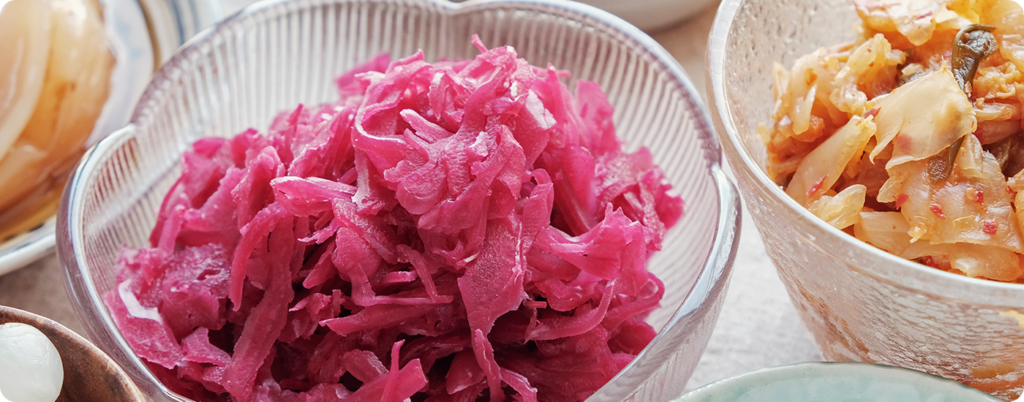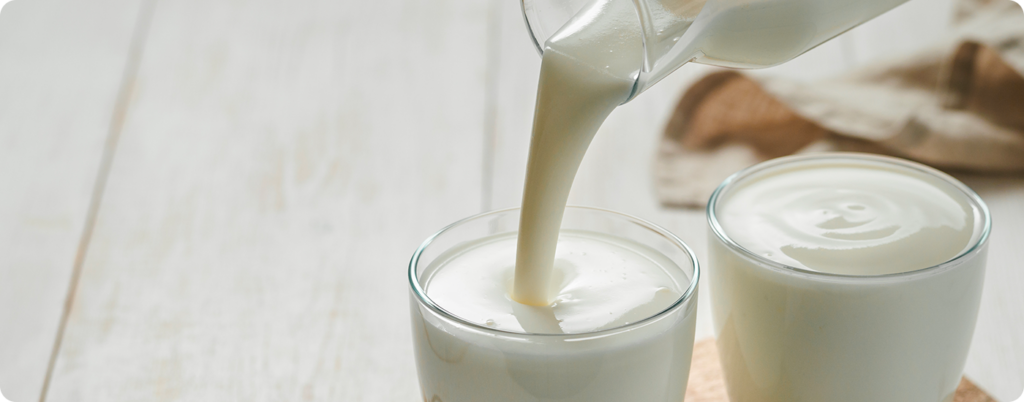- What are Probiotics?
- Supplemental Probiotics
- Building a Foundation for Gut Health
- Fermented Foods
- Resources To Learn More
- Probiotic Supplements May Not Be Your Best Bet
PLEASE NOTE: The information in this blog is for educational purposes only. It is not a substitute for professional medical advice. Consult your healthcare provider if you’re seeking medical advice, diagnoses, or treatment.
Our history with microorganisms looks like a bad romance. At first, we didn’t know they existed; then, we thought they were all dangerous, but now we realize that they’re intricately woven into the fabric of life on Earth.
At this point, science reveals how little we know about microorganisms and how they contribute to or detract from human health.
For example, when performing DNA analysis of human fecal samples, up to 50% of the microorganism signatures are unrecognized – meaning we haven’t identified and cataloged them (1). That’s a massive volume of unknown organisms living inside our bodies.
Our understanding of the gut microbiome is expanding, but still minuscule compared to what we don’t know. We can see that microbiomes vary widely between individuals. They’re influenced by genetics, diet, geography, and lifestyle (2).
People often ask, “Should I take supplemental probiotics?” when addressing gut health.
In this article, we’ll discuss the answer to that question and suggest diet and lifestyle choices that can improve your gut health!
What are Probiotics?
Probiotics are living microorganisms that benefit the host when administered adequately (3).
The worldwide market for probiotics was estimated at $77 billion in 2022 alone as companies consistently add probiotics to food and beverages (4).
For reference, Panama’s gross domestic product (GDP) in 2022 was just under $77 billion. The probiotic market is expected to surpass $87 billion during 2023!
Probiotics are naturally found in a wide variety of foods or supplement forms. In particular, dairy products (yogurt, raw cheese, and milk) can be rich sources of probiotics. Fermented foods like sauerkraut, pickles, kefir, and kombucha are also potent sources of probiotics.
Fermentation preserves food through natural acidity, the absence of oxygen, and the presence of salt and healthy organisms. This process can allow certain foods to gain nutritional value and become more digestible!
Supplemental Probiotics Are Like a Coat of Paint
The belief that we can helicopter in megadoses of beneficial bacteria and expect a positive outcome seems like a rational hypothesis, especially because we use antibiotic medicine to flush harmful bacteria.
The key to a healthy microbiome is the environment. Beneficial bacteria thrive with access to the right environment and dietary inputs.
Imagine that your car is very rusty, so you paint it. The corrosion will worsen if you don’t remove the rust and seal the metal first. When you take supplemental pre-and probiotics, you’re hoping that you can correct an imbalance in your microbiome without addressing the root problem(s).
Prebiotic supplements usually provide fiber, an essential “food” for gut bacteria. However, eating lots of fiber may not translate to a diverse microbiome (5).
Probiotic supplements focus on a few species of bacteria and have rarely been examined in studies (6). In addition, the long-term safety of probiotics needs to be better understood (7).
Supplementing with probiotics may be less effective than you’d think, given the dollars spent each year. It may be more beneficial to focus on other diet and lifestyle choices before incorporating a probiotic supplement.
Building a Foundation for Gut Health
We can’t look at a record of human microbiomes throughout history. We can only gather a few clues and piece together a picture.
At the very least, our ancestors weren’t popping probiotic supplements; they also had far more exposure than we do to bacteria through dirt, hunting, and animal husbandry.
Most individuals’ diets and lifestyles differ dramatically from what their ancestors experienced.

The human gut has lost alpha diversity as society becomes more urbanized (8). While exposure to soil and feces has decreased, usage of antibiotics, hygienic measures, and intake of processed foods have all increased.
Not to mention, modern soil often lacks natural fertility, microbial richness, and plant diversity (9). The goal when producing food is now primarily on improving yields, increasing shelf life, and transportability. This requires using pesticides and techniques such as pasteurization that can strip away beneficial bacteria and harm the soil.
Of course, some bacteria in those sources caused diseases (like dysentery). However, the health and complexity of the human biome is a function of its environment. When you cleanse that environment of certain microorganisms, it can cause problems.
Eating an ancestrally consistent diet based on nutrient-rich muscle, organ meat, and low-toxicity plant foods can shift gut bacteria in the right direction and help improve your health.
It’s also important to eliminate substances and foods that contribute to dysbiosis (microbial imbalance) in the gut. This includes heavily processed foods, seed oils, and potentially specific plant foods with high levels of defense chemicals.
Plus, lifestyle choices, such as getting adequate sleep, sunlight, and exercising, can support your gut health.

All that said, probiotics can be beneficial for specific health challenges. Still, working with a medical professional is crucial for identifying the proper options for your needs. If misused, probiotics can exacerbate symptoms or be a waste of money.
Fermented Foods as An Alternative to Supplementation
Emerging research shows that the diversity of healthy bacteria in your gut is far more important than your fiber intake or probiotic supplementation routine.
These studies have shown that traditionally fermented veggies, dairy products, etc., are foods that actually help promote healthy alpha diversity of the gut (10).

Researchers compared a diet high in fiber-rich foods to a diet high in traditionally fermented foods.
The diet high in fiber had no change in microbial diversity. It increased markers of inflammation, while a diet high in fermented foods increased microbial diversity and decreased markers of inflammation.
Fermented foods are some of the most powerful foods for improving gut health, and they’ve been around for thousands of years (11).
Like probiotics or other food items, not all fermented foods are created equally. When eating fermented foods, there are a few guidelines to keep in mind:
1. Choose living foods
Some “fermented” foods at the grocery store, such as pickles and sauerkraut, have been pasteurized and canned. This kills the beneficial bacteria. They might look and taste like fermented foods, but the benefit isn’t quite the same.
Grocery stores keep virtually all traditionally fermented foods in the refrigerated section (this slows down the fermentation process and keeps jars from overflowing).
Look for products made without vinegar or lactic acid, as these are used to shortcut the fermentation process. Bubbies is an excellent brand with traditional recipes.
We suggest focusing on lacto-fermented pickles, sauerkraut, and milk kefir. These are fairly common items in grocery stores (they’re also easy to make at home) and align with the low-toxicity philosophy of the animal-based diet.

Milk kefir (pronounced “KEFF-EAR”) is remarkable because the kefir bacteria eat the milk’s lactose, which can increase digestibility. Pickles are made from cucumbers, which are a fruit. The fermentation process of sauerkraut helps to cut down on the defense chemicals found in cabbage.
Kimchi is a hugely popular fermented food from Southeast Asia. Due to the high concentration of spices and the lectins they contain, we don’t suggest it as a low-toxicity fermented food.
The animal-based infographic outlines other low-toxicity foods to prioritize.
2. Avoid artificial sweeteners and excessive amounts of added sugars
Many grocery stores’ fermented foods and drinks (like kombucha) have high levels of added sugar or artificial sweeteners – check the labels before you buy.
As Dr. Paul discusses in this podcast episode, artificial sweeteners (sucralose, aspartame, stevia, monk fruit, etc.) can alter a person’s insulin sensitivity, glucose tolerance, appetite, and gut flora.
So, when drinking kombucha, it’s ideal to make your own or look for options without artificial sweeteners or excessive amounts of added sugar.
Alcohol is technically a fermented beverage, but alcohol can harm the brain and gut.
3. Enjoy the juice
Don’t ignore the juice from your pickles or sauerkraut! The liquid from traditionally fermented foods contains salt and lots of beneficial bacteria.
4. Make your own
Buying traditionally fermented foods at the grocery store can be expensive.
However, fermenting at home is easy and affordable if you have simple tools and follow established recipes (see the resources section below). Here’s a quick video from Dr. Paul explaining how he makes raw kefir.
Resources To Learn More
If you want to learn more about probiotics, fermented foods, or gut health, here are a few resources to get you started.

1. Podcast: Dr. Justin Sonnenburg: How to Build, Maintain & Repair Gut Health (135 minutes, YouTube)
In this episode of the Huberman Lab Podcast, Andrew Huberman’s guest is Dr. Justin Sonnenburg, Professor of Microbiology and Immunology at Stanford University. Dr. Sonnenburg’s research focuses on how microbes in our gut impact our mental and physical health and how diet and environment shape the gut microbiome.
They discuss the architecture of the gut microbiome and microbiota variability in different gastrointestinal (GI) tract regions and how these can change in response to diet, environment, or genetics. Other topics include cesarean section, probiotics, and prebiotics.

2. Book: The Art of Fermentation ($30 + S&H)
(Note: The food philosophy of this book doesn’t align entirely with an animal-based diet, but it is one of the best texts on DIY fermentation).
Sandor Katz presents the concepts and processes behind fermentation in simple ways to guide a reader through their first experience making sauerkraut or yogurt and in-depth enough to provide greater understanding and insight for experienced practitioners.

3. Website: Heart & Soil Supplements – Digestive Health Stack
Organ meats can be a great addition to your diet if you aim to improve digestive health. Organ meats offer vitamins, minerals, and micronutrients essential for overall health. This stack consists of three products supporting the gut, immune system, and thyroid health.

4. Video: Is sourdough bread healthy? (1 minute, YouTube)
Paul Saladino, MD, briefly highlights another fermented food, sourdough bread. He explains that some gluten and phytic acid are left over after fermentation, potentially irritating certain individuals.
Probiotic Supplements May Not Be Your Best Bet
So, should you take a probiotic supplement? It depends!
Probiotic supplements are expensive and poorly regulated. Just about every grocery or convenience store sells probiotics.
Before adding a probiotic supplement, research and work with a medical professional to find the best option. Taking a run-of-the-mill probiotic from your local drugstore without research may not be the best strategy.
Not only are probiotics poorly regulated, but they can cost a pretty penny. The worldwide market for probiotics is approaching $80 billion per year as probiotics are increasingly used in food and beverages. Many dogs are even taking probiotic supplements!
Probiotics can be a supplement to cut out when adopting an animal-based diet and lifestyle!
Instead, you can incorporate fermented foods like sauerkraut, kefir, pickles, or a high-quality kombucha that benefits the gut microbiome.
Fermented foods have been used for thousands of years. Lifestyle habits like sunlight exposure, quality sleep, stress reduction, and exercise can also improve your gut health.
Subscribe to future articles like this: